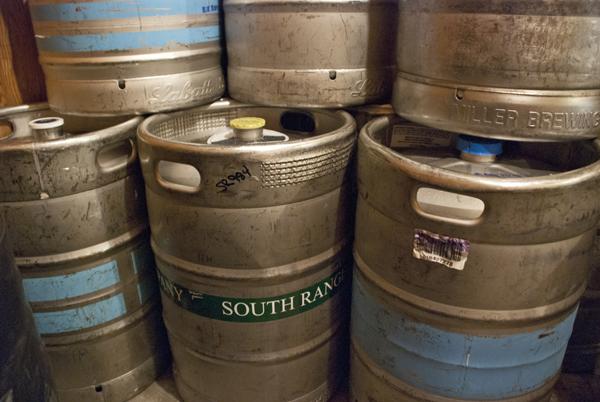CLICK HERE TO VIEW A KEG TAG EXAMPLE
Starting Nov. 1, Beer Keg Tags will be required on all kegs in Michigan.
A bill that was passed last year requires the tags be placed on all beer kegs that hold five gallons or more. Tags are being provided free of charge to licensees by the Michigan Liquor Control Commission (MLCC).
The information that a customer must provide to buy a keg is a valid state ID, birth date, telephone number, address and ID number. If the keg is returned without the tag attached, the retailer is not allowed to return the keg deposit to the purchaser.
“We used the media, social media and industry groups to get the word out about this new requirement,” said Andrea Miller, communication representative for the MLCC.
According to the Department of Licensing and Regulatory Affairs website, there is significant cost, to the MLCC for complying with this new requirement and it is important that licensees not be hit with the costs of obtaining the tags. So to offset the cost they are using inexpensive forms of communication to get the word out.
“This legislation was signed into law last year and now that the lengthy process of getting the tags designed and printed is finished, we have given licensees one month to comply,” Miller said.
The Superior Blue Link Party Store found out about this regulation a couple months ago, said Jennifer Gustafson, store manager. The store has not received their keg tags yet.
“I don’t think it’s going to hurt (the sale of kegs), but it’s definitely going to make it difficult,” Gustafson said. “People are going to drink if they want to drink.”
The tag that will be placed on the keg will only have the buyer’s initials. The keg tags are supposed to be stickered to the keg while it’s in the cooler.
“(The keg tags) are a very bad idea,” Gustafson said. “I just don’t see the point of it. It’s going to make everything difficult for how busy we are (with) having to go through this extra process for a keg.”
If a person not licensed as a retailer by the MLCC removes the keg tag, allows the removal of the tag, and/or provides false information in the purchase of the beer keg, is guilty of a misdemeanor punishable by imprisonment for not more than 93 days or a fine of not more than $500, or both.
“(The punishment) is way too harsh,” Gustafson said. “It’s just another way for the state to make money. The whole process is just another way for someone to screw up and make the common man a criminal.”
Gustafson is not the only one that feels the punishments are too harsh. Catherine Sromek, a senior biology environmental conservation major, agrees.
“If it gets removed by a friend or accidently removed, you can’t prove that,” Sromek said.
The bill does not specifically address the issue of how the sticker gets removed but just getting removed is punishable.
By signing the receipt, the individual agrees not to damage the keg and not to remove or alter the attached identification tag and is subject to liability of serving the beer to any minor.
“This isn’t a great way to necessarily combat underage drinking because if (underaged people) are going to drink they’re going to drink anyways,” Sromek said. “To who (the vendors) are selling to, they should obviously be 21 or older but what happens to the beer after that should not be the vendor’s responsibility.”
Including Michigan, 31 states and the District of Columbia now have keg tagging laws intended to hold adults responsible for providing alcohol to minors. Wisconsin and Ohio are not included in the 31 states.
































Chris • Nov 2, 2011 at 7:40 pm
Are we in Germany?! What year is it?!
B • Nov 1, 2011 at 7:48 pm
One month is not enough time for retailers to comply, especially given the fact that the MLCC has chosen to “offset costs” to retailers by refusing to contact them through normal, time-proven methods of communication, instead choosing to use social media (with 538 of people who “like” them on Facebook compared to, say, the 160 currently active licensees in Marquette County. Or the 1649 active licensees in Oakland County.)
Also, did Andrea Miller directly read from the MLCC FAQ in your interview with her? Because her quote from the second column of the printed version of this article is word for word from the FAQ here: http://www.michigan.gov/lara/0,4601,7-154-10570-263909–,00.html.
Bob • Oct 30, 2011 at 9:36 pm
The tagging of beer kegs and gathering user information on them is great. Fingerprints would be a great further step. This is an effective way to combat underage drinking. The punishments are not too harsh. Sorry children.